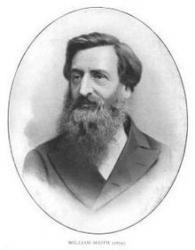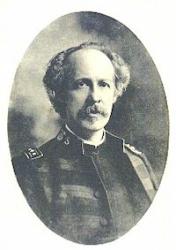Planning worship?
Check out our sister site, ZeteoSearch.org,
for 20+ additional resources related to your search.
- |
User Links
Person Results
George W. Cooke
1884 - 1951 Arranger of "TUCKER " in Hymns We Love George William Cooke was born in Yorkshire, England in 1884 and died in Jamestown, New York in 1951. He was the author of "Joy in My Heart" which was copyrighted in 1926 (but not renewed). At that time he was living in Wilmington, Delaware. He was a minister and associated with a group called Gospel Crusaders which was associated with the Methodist Church. He ran the Delmarva Camp, a Methodist camp that held gospel meetings and revivals. He was later minister of Methodist churches in Buffalo and Rochester New York.
Dianne Shapiro from research done by Richard L. Green
George W. Cooke
William Booth

1829 - 1912 Author of "Send the Fire" in The Cyber Hymnal Rv William Booth United Kingdom 1829-1912 Born in Sneinton, Nottingham, his father, well-off, lost much of his wealth and descended into poverty when William was young. William was apprenticed to a pawnbroker at age 13 to pay for schooling fees. He was converted at 15 and read extensively and trained himself in writing and speech. He eventually became a Methodist preacher. He did evangelistic work with his friend, Will Sansom, preaching to the poor on Nottingham. He would have stayed with Will, but Sansom got tuberculosis and died in 1849. William spent a year looking in vain for work. He finally found work with a pawnbroker in London, but the small amount of pay from that and preaching was insufficiennt, so he resigned as a lay preacher and turned to open-air evangelism in the streets and on Kennington Common, London. In 1851 he joined the Methodist Reformed Church and became a full-time preacher at their headquarters at Binfield Chapel in Clapham. In 1853 he became Reformers' minister at Spalding, Lincolnshire. He married Catherine Mumford in 1855 in London. Over the years they had eight children. As a reformer minister he found he had to neglect some duties in order to carry on evangelistic campaigns. After three years as pastor at Gateshead, he requested freedom to pursue evangelism, but was refused. He resigned his ministry of the Methodist New Connexion. Soon he was barred from campaigning in Methodist congregations, so he became an independent evangelist. He started a match factory, making boxes of “Salvation Army” matches and paying his workers more than the competition. He founded the Salvation Army in 1865 and became its first General (1878-1912). The Christian movement, with a quasi-military structure and government, spread from London to many parts of the world and is known for being one fo the largest distributors of humanitarian aid. He and his wife opened the Christian Revival Society in London, holding regular evening meetings. It became the East London Christian Mission, in an old warehouse. It was one of 500 charitable groups in London's east end. It began serving food as well as ministry. Over the years the ministry name changed to Salvation Army (SA), but the struggle to minister and serve poor people was ongoing. Eventually, the SA expanded to other countries in the British realm, then to countries outside. During his lifetime, the SA was in 58 countries and colonies, as he traveled extensively and held Salvation meetings. He authored books and published a magazine. He also composed several songs. One book, “In darkest England and the way out” became a best seller after 1890 and set the foundation for SA's modern social welfare approach. He had many antagonists until his late years, when antagonism turned to acceptance, and finally to approbation, when he received honors from English leaders and the monarchy. His funeral, held at London's Olympia, was attended by 40,000, and 150,000 people filed past his casket, World leaders paid him homage.
John Perry
William Booth
Anonymous
Person Name: Anon. Author of "Follow Me" in Glad Gospel Songs In some hymnals, the editors noted that a hymn's author is unknown to them, and so this artificial "person" entry is used to reflect that fact. Obviously, the hymns attributed to "Author Unknown" "Unknown" or "Anonymous" could have been written by many people over a span of many centuries.
Anonymous
George D. Watson
1845 - 1924 Person Name: Rev. George D. Watson Author of "Follow Me" in Hymns We Love
George D. Watson
Walton J. Brown
1913 - 2001 Person Name: Walton J. Brown (1913-2001) Vers. esp. of "Oí la voz del buen Jesús" in Himnario Adventista del Séptimo Día Used pseudonym Juan Marrón.
Walton John Brown was the education director of the Seventh-day Adventist Church worldwide. He worked in the United States, Argentina, Brazil and Cuba.
Dianne Shapiro from obituary
Walton J. Brown
Juan Marrón
Person Name: J. Marron Author of "Oí la voz del buen Jesús" in Himnario Adventista Pseudonym. See Brown, Walton John
Juan Marrón
Herbert G. Tovey
1888 - 1972 Arranger of "[I hear my risen Savior say]" in Revival Hymns and Choruses
Herbert G. Tovey
Frederick St. George De Lautour Booth-Tucker

1853 - 1929 Person Name: Commander Booth Tucker Composer of "[There is a better world, they say]" in One Hundred Favorite Songs and Music
Frederick St. George De Lautour Booth-Tucker


 My Starred Hymns
My Starred Hymns


